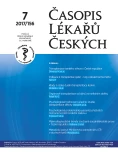-
Medical journals
- Career
Intestinal transplantation in Czech Republic
Authors: Martin Oliverius 1,8; Libor Janoušek 1; Michal Kudla 1; Petr Wohl 2; Jan Kopecký 2; Eva Kieslichová 3; Dana Němcová 7; Pavel Trunečka 4; Pavel Drastich 4; Eva Honsová 5; Dana Kautznerová 6; Hana Baštová 2; Bohumila Heřmanová 1; Jiří Froněk 1
Authors‘ workplace: Klinika transplantační chirurgie IKEM, Praha 1; Centrum diabetologie IKEM, Praha 2; Klinika anestesiologie a resuscitace IKEM, Praha 3; Klinika hepatogastroenterologie IKEM, Praha 4; Pracoviště klinické a transplantační patologie IKEM, Praha 5; Pracoviště radiodiagnostiky a intervenční radiologie IKEM, Praha 6; Pracoviště laboratorních metod IKEM, Praha 7; Chirurgická klinika 3. LF UK a FNKV, Praha 8
Published in: Čas. Lék. čes. 2017; 156: 349-354
Category: Original Article
Overview
Intestinal transplantation represents a suitable treatment for patients with intestinal failure who then develop life-threatening complications of total parenteral nutrition and for some patients with complex abdominal disorders not suitable for conventional treatment.
Methods:
prior to launch of the clinical program, preparation started in 2006 initially with extensive experimentation carried out on pigs. The clinical phase involved a specialized, multidisciplinary team who examined 23 patients being considered for transplantation. Seven patients were put on a waiting list and one female, due to the improvement of her medical status, was unlisted. The first ever intestinal transplantation was done in 2014.Results:
three out of six transplanted patients are alive with 380 days of actual survival; median 131 days (63–763). Two patients are on a full oral diet and nutritionally independent with an excellent quality of life. One female is nutritionally independent but with the need for partial supplemental parenteral rehydration due to the stomal output.Conclusion:
intestinal transplantation is a suitable treatment for highly selected patients with intestinal failure who meet specific listing criteria.Keywords:
intestinal transplantation, multivisceral transplantation, intestinal failure, parenteral nutrition, short bowel syndrome
Sources
1. Oliverius M, Baláž P, Kudla M et al. Small bowel graft revascularization in experiment. Bratislavské lekárske listy 2009; 110(2): 65–68.
2. Baláž P, Kudla M, Lodererová A et al. Preservation injury of the small bowel graft in clinical small bowel transplantation. Bratislavské lekárske listy 2007; 108(12): 516–8.
3. Oliverius M, Kudla M, Baláž P et al. Transplantatace tenkého střeva v experimentu. Rozhledy v chirurgii 2009; 88(11): 662–668.
4. Oliverius M, Kudla M, Baláž P, Valsamis A. Hladina plazmatického citrulinu - spolehlivý neinvazivní ukazatel množství funkčních enterocytů. Časopis lékařů českých 2010; 149(4): 160–162.
5. Scott NA, Irving MH. Intestinal failure – the clinical problem. Dig Dis 1992; 10(5): 249–257.
6. Pironi L, Arends J, Baxter J et al. ESPEN endorsed recommendations. Definition and classification of intestinal failure in adults. Clin Nutr 2015; 34(2): 171–180.
7. Drastich P, Oliverius M. Crohn’s Disease and Intestinal Transplantation. Dig Dis 2017; 35(1–2): 127–133.
8. Salvino R, Ghanta R, Seidner DL et al. Liver failure is uncommon in adults receiving long-term parenteral nutrition. J Parenter Enteral Nutr 2006; 30(3): 202–208.
9. Cavicchi M, Beau P, Crenn P et al. Prevalence of liver disease and contributing factors in patients receiving home parenteral nutrition for permanent intestinal failure. Ann Intern Med 2000; 132(7): 525–532.
10. Vianna RM, Mangus RS, Kubal C et al. Multivisceral transplantation for diffuse portomesenteric thrombosis. Ann Surg 2012; 255(6): 1144–1150.
11. Garg M, Jones RM, Vaughan RB, Testro AG. Intestinal transplantation: current status and future directions. J Gastroenterol Hepatol 2011; 26(8): 122–128.
12. Jeppesen PB. Glucagon-like peptide-2: update of the recent clinical trials. Gastroenterology 2006; 130(2 Suppl. 1): S127–S131.
13. Kim HB, Fauza D, Garza J et al. Serial transverse enteroplasty (STEP): a novel bowel lengthening procedure. J Pediatr Surg 2003; 38(3): 425–429.
14. Bianchi A. Longitudinal intestinal lengthening and tailoring: results in 20 children. J R Soc Med 1997; 90(8): 429–432.
15. Pironi L, Hébuterne X, Van Gossum A et al. Candidates for intestinal transplantation: a multicenter survey in Europe. Am J Gastroenterol 2006; 101(7): 1633–1643.
16. Pironi L, Forbes A, Joly F et al. Survival of patients identified as candidates for intestinal transplantation: a 3-year prospective follow-up. Gastroenterology 2008; 135(1): 61–71.
17. Matsumoto CS, Kaufman SS, Fishbein TM. Inclusion of the colon in intestinal transplantation. Curr Opin Organ Transplant 2011; 16(3): 312–315.
18. Huard G, Schiano T, Moon J, Iyer K. Choice of Allograft in Patients Requiring Intestinal Transplantation: A Critical Review. Can J Gastroenterol Hepatol 2017 : 1069726.
19. Abu-Elmagd KM, Costa G, Bond GJ et al. Five hundred intestinal and multivisceral transplantations at a single center: major advances with new challenges. Ann Surg 2009; 250(4): 567–581.
20. Berger M, Zeevi A, Farmer DG, Abu-Elmagd KM. Immunologic challenges in small bowel transplantation. Am J Transplant 2012; 12(Suppl. 4): S2–S8.
Labels
Addictology Allergology and clinical immunology Angiology Audiology Clinical biochemistry Dermatology & STDs Paediatric gastroenterology Paediatric surgery Paediatric cardiology Paediatric neurology Paediatric ENT Paediatric psychiatry Paediatric rheumatology Diabetology Pharmacy Vascular surgery Pain management Dental Hygienist
Article was published inJournal of Czech Physicians

-
All articles in this issue
- Intestinal transplantation in Czech Republic
- Indications to liver transplantation
- Pros and cons of dual kidney transplantation
- Psychological evaluation of uterus transplantation trial participants
- Psychological problems of patients who survived cardiac arrest out of hospital
- Current macro-diagnostic trends of forensic medicine in the Czech Republic
- The Guideline on Spiritual Care of the Ministry of Health of the Czech Republic
- Organ transplantation from donors after circulatory death
- Journal of Czech Physicians
- Journal archive
- Current issue
- Online only
- About the journal
Most read in this issue- Indications to liver transplantation
- Intestinal transplantation in Czech Republic
- Organ transplantation from donors after circulatory death
- Psychological problems of patients who survived cardiac arrest out of hospital
Login#ADS_BOTTOM_SCRIPTS#Forgotten passwordEnter the email address that you registered with. We will send you instructions on how to set a new password.
- Career

